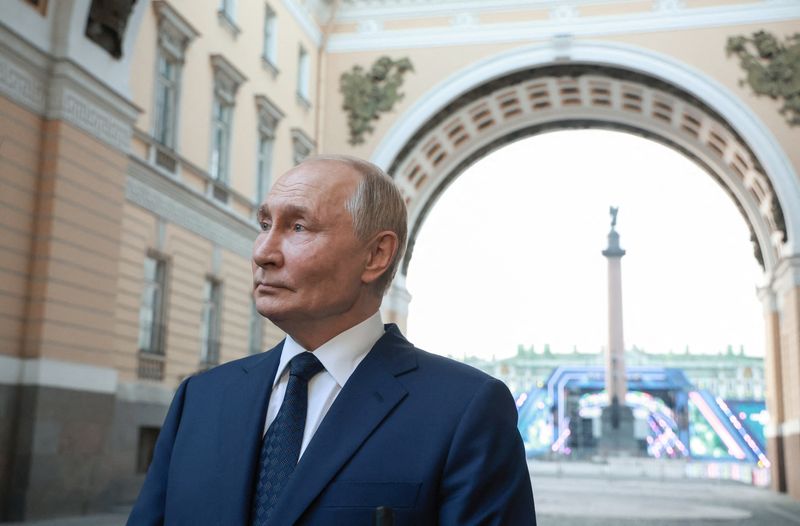By Gleb Bryanski, Darya Korsunskaya and Gleb Stolyarov
MOSCOW (Reuters) – Russian officials and executives are baffled by President Vladimir Putin’s surprise threat to restrict exports of strategic raw materials in response to Western sanctions, wondering whether this can be achieved without hurting Russia more than it West.
Putin made the suggestion 23 minutes into a routine government meeting on Wednesday, asking Prime Minister Mikhail Mishustin to come up with some ideas that would not harm Russian interests.
Yet many Russian commodities, such as oil, gas, nickel, titanium, gold and diamonds, are already subject to varying levels of voluntary or mandatory import restrictions or even bans imposed by the West itself.
Russian government officials and business leaders were caught off guard.
“Everyone is in shock,” said a source at one of the affected companies, who spoke on condition of anonymity because of the sensitivity of the appearance of criticism of the president. “This initiative really came out of the blue.”
Another company source said: “It’s like shooting yourself in the foot.”
Limiting exports of uranium, nickel and titanium – which Putin explicitly mentioned – would reduce the foreign exchange earnings of Russia’s largest companies, including state industrial conglomerate Rostec, state nuclear monopoly Rosatom and Nornickel, the largest producer of refined nickel in the world.
Together they employ around a million people, and their incomes have already been hit by Western sanctions.
Nornickel’s first-half profits fell 22% as the company tries to shift its exports to Asia. It has described the combination of low nickel prices and Western sanctions as a “perfect storm.”
The world market price of nickel may have skyrocketed due to Putin’s comments, but the current wealth of supply means it is well below historic highs.
A Russian government source, who also spoke on condition of anonymity, said any ban should spare so-called “friendly” countries, including China, Russia’s main trading partner.
URANIUM RESTRICTIONS COULD HARM THE WEST
The source stressed that it would take some time for the government to develop the plan – and that an order from the president to do so had yet to reach the government.
Another source close to the government added that Putin “asked to work out a plan, but it was not implemented.”
Major Russian commodity producers declined to comment.
Russia and the West are entering a new level of confrontation over the war in Ukraine, and Russia is considering ways to respond to what it says is almost certainly Western approval for Ukraine to strike deep inside Russia using Western weapons .
Putin said that if Russia went ahead, the measure would not be limited to uranium, nickel and titanium. He noted that Russia has 22% of world reserves, 23% of gold reserves and 55% of global diamond reserves.
may be the only product where restrictions could actually harm the West.
Russia was responsible for 27% of the enriched uranium supplied to US commercial nuclear reactors last year. While the US theoretically banned imports of the fuel from Russia, it also provided waivers through 2027 as the country expanded its own enrichment facilities.
Yet Europe has largely weaned itself off the Russian gas it used to depend on. The Group of Seven and the European Union’s ban on the import of diamonds of Russian origin forced Moscow to buy diamonds from sanctions-hit producer Alrosa. And all of Russia’s major gold producers are already under Western sanctions.
Meanwhile, Russia’s largest titanium sponge manufacturer VSMPO-AVISMA, partly owned by Rostec, is struggling to find replacements for the supply of titanium concentrate from Ukraine, with which Russia is at war.
Putin himself emphasized that the restrictions would not happen ‘tomorrow’, and that they should not harm Russian interests.

On Friday, Kremlin spokesman Dmitry Peskov emphasized the as yet hypothetical nature of the idea.
“There are no details yet, it was a proposal to think about it without harming ourselves, without harming our own interests,” he said. “They (the government) will consider it.” (This story has been refiled to remove redundant text, in paragraph 2)


